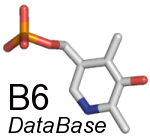|
|
| type |
Journal Article |
| authors |
Hontzeas N, Zoidakis J, Glick BR, Abu-Omar MM. |
| title |
Expression and characterization of 1-aminocyclopropane-1-carboxylate deaminase from the rhizobacterium Pseudomonas putida UW4: a key enzyme in bacterial plant growth promotion. |
| journal |
Biochim Biophys Acta |
| Activity |
3.5.99.7 |
| Family |
3.5.99.7 |
| sel |
selected |
| ui |
15588698 |
| year |
(2004) |
| volume |
1703 |
| number |
1 |
| pages |
11-9 |
| | |
|---|
| abstract |
The enzyme 1-aminocyclopropane-1-carboxylate deaminase (ACCD) converts ACC, the precursor of the plant hormone ethylene, to alpha-ketobutyrate and ammonium. This enzyme has been identified in soil bacteria and has been proposed to play a key role in microbe-plant association. A soluble recombinant ACCD from Pseudomonas putida UW4 of molecular weight 41 kDa has been cloned, expressed, and purified. It showed selectivity and high activity towards the substrate ACC: K(M)=3.4+/-0.2 mM and k(cat)=146+/-5 min(-1) at pH 8.0 and 22 degrees C. The enzyme displayed optimal activity at pH 8.0 with a sharp decline to essentially no activity below pH 6.5 and a slightly less severe tapering in activity at higher pH resulting in loss of activity at pH>10. The major component of the enzyme's secondary structure was determined to be alpha-helical by circular dichroism (CD). P. putida UW4 ACCD unfolded at 60 degrees C as determined by its CD temperature profile as well as by differential scanning microcalorimetry (DSC). Enzyme activity was knocked out in the point mutant Gly44Asp. Modeling this mutation into the known yeast ACCD structure shed light on the role this highly conserved residue plays in allowing substrate accessibility to the active site. This enzyme's biochemical and biophysical properties will serve as an important reference point to which newly isolated ACC deaminases from other organisms can be compared. |
| last changed |
2018/05/07 13:07 |
|











